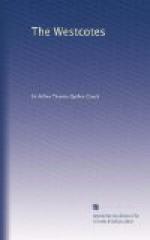“The house would be remarkable anywhere—even in my own Provence—so closely has it kept the original lines. In half-an-hour one could reconstruct—”
“Ay!” chimed in the delighted Narcissus. “You shall try, M. Raoul, you shall try! I promise to catch you tripping.”
“Yonder runs the Fosse Way, west by south. The villa stands about two hundred yards back from it, facing the south-east—”
“A little east of south. The outer walls did not run exactly true with the enclosed quadrangle.”
“You say that the front measured two hundred feet, perhaps a little over. Clearly, then, it was a domain of much importance, and the granaries, mills, stables, slaves’ dwellings would occupy much space about it—an acre and a half, at least.”
“Portions of a brick foundation were unearthed no less than three hundred yards away. A hypocaust lay embedded among them, much broken but recognisable.”
“What puzzles me,” mused M. Raoul, is how these southern settlers managed to endure the climate.”
“But that is explicable.” Narcissus was off now, in full cry. “The trees, my dear sir, the trees! I have not the slightest doubt that our Bayfield elms are the ragged survivors of an immense forest—a forest which covered the whole primaeval face of Somerset on this side of the fens, and through which Vespasian’s road-makers literally hewed their way. Given these forests—which, by the way, extended over the greater part of England—we must infer a climate totally unlike ours of this present day, damper perhaps, but milder. Within his belt of trees the colonist, secure from the prevailing winds, would plant a garden to rival your gardens of the South—’primus vere rosam atque autumno carpere Poma.’”
“Yes,” added M. Raoul, taking fire; “and, perhaps, a plant of helichryse or a rose-cutting from Paestum, to twine about the house-pillars and comfort his exile.”
“M. Raoul?” Dorothea’s voice interrupted them. She stood by the looped curtain, and reproached Narcissus with a look. “He has had no tea yet; it was cruel of you to detain him. My brother, sir,” she turned to Raoul, “has no conscience when once set going on his hobby; for, of course, you were discussing the pavement?”
“We were talking, Mademoiselle, at that moment of the things which brighten and comfort exile.”
She lowered her eyes, conscious of a blush, and half angry that it would not be restrained.
“And I was talking of tea, if that happens to be one of them,” she replied, forcing a laugh.
“Well, well,” said Narcissus, “take M. Raoul away and give him his tea; but he must come with me afterwards, while there is light, and we will go over the site together. I must fetch my map.”
He hurried across the hall.
“Come, M. Raoul,” said Dorothea, stepping past her guest and leading the way, “by a small detour we can reach that end of the library which is least crowded.”




